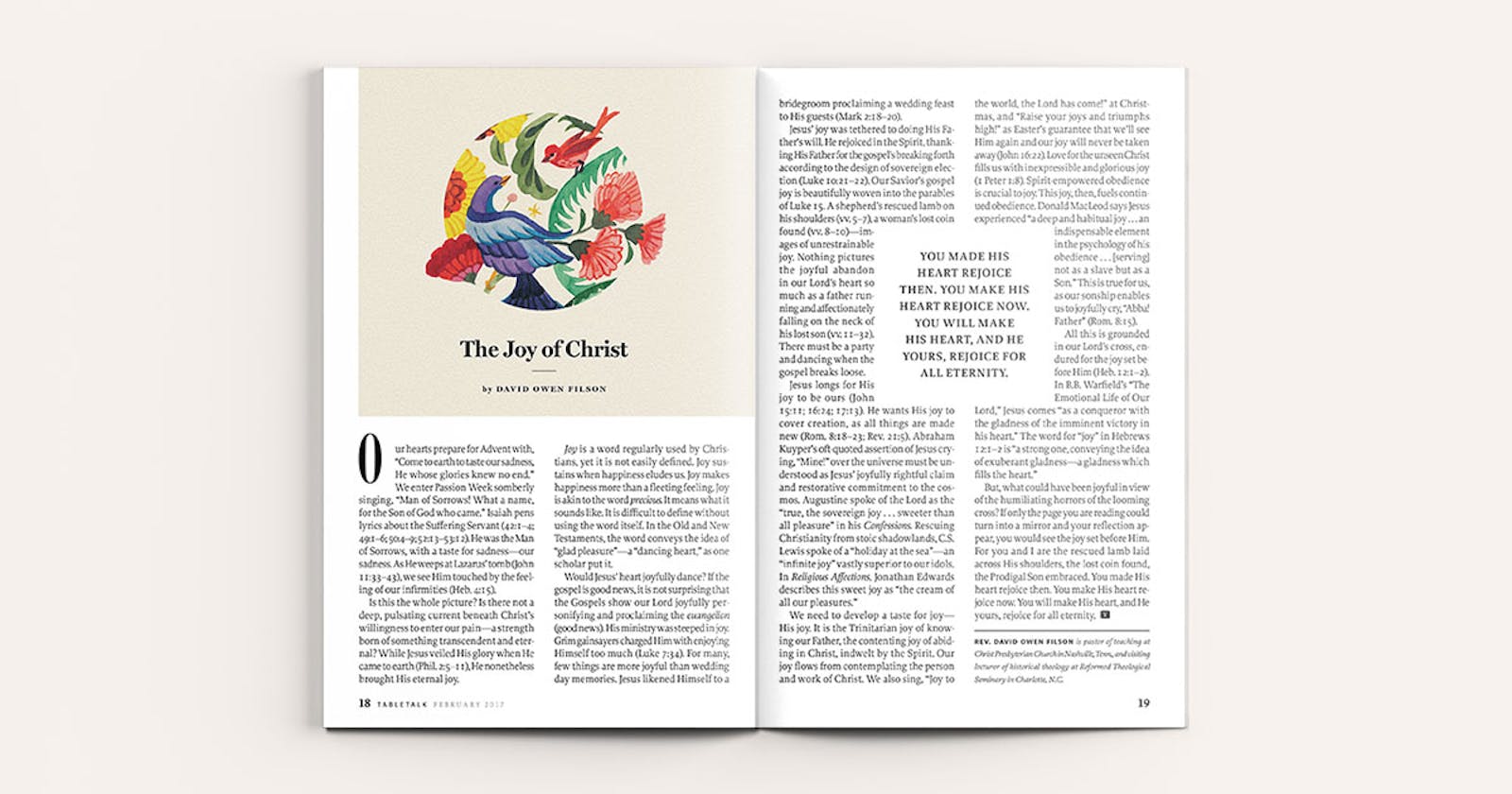
Request your free, three-month trial to Tabletalk magazine. You’ll receive the print issue monthly and gain immediate digital access to decades of archives. This trial is risk-free. No credit card required.
Try Tabletalk NowAlready receive Tabletalk magazine every month?
Verify your email address to gain unlimited access.
Our hearts prepare for Advent with, “Come to earth to taste our sadness, He whose glories knew no end.” We enter Passion Week somberly singing, “Man of Sorrows! What a name, for the Son of God who came.” Isaiah pens lyrics about the Suffering Servant (42:1–4; 49:1–6; 50:4–9; 52:13–53:12). He was the Man of Sorrows, with a taste for sadness—our sadness. As He weeps at Lazarus’ tomb (John 11:33–43), we see Him touched by the feeling of our infirmities (Heb. 4:15).
Is this the whole picture? Is there not a deep, pulsating current beneath Christ’s willingness to enter our pain—a strength born of something transcendent and eternal? While Jesus veiled His glory when He came to earth (Phil. 2:5–11), He nonetheless brought His eternal joy.
Joy is a word regularly used by Christians, yet it is not easily defined. Joy sustains when happiness eludes us. Joy makes happiness more than a fleeting feeling. Joy is akin to the word precious. It means what it sounds like. It is difficult to define without using the word itself. In the Old and New Testaments, the word conveys the idea of “glad pleasure”—a “dancing heart,” as one scholar put it.
Would Jesus’ heart joyfully dance? If the gospel is good news, it is not surprising that the Gospels show our Lord joyfully personifying and proclaiming the euangelion (good news). His ministry was steeped in joy. Grim gainsayers charged Him with enjoying Himself too much (Luke 7:34). For many, few things are more joyful than wedding day memories. Jesus likened Himself to a bridegroom proclaiming a wedding feast to His guests (Mark 2:18–20).
Jesus’ joy was tethered to doing His Father’s will. He rejoiced in the Spirit, thanking His Father for the gospel’s breaking forth according to the design of sovereign election (Luke 10:21–22). Our Savior’s gospel joy is beautifully woven into the parables of Luke 15. A shepherd’s rescued lamb on his shoulders (vv. 5–7), a woman’s lost coin found (vv. 8–10)—images of unrestrainable joy. Nothing pictures the joyful abandon in our Lord’s heart so much as a father running and affectionately falling on the neck of his lost son (vv. 11–32). There must be a party and dancing when the gospel breaks loose.
Jesus longs for His joy to be ours (John 15:11; 16:24; 17:13). He wants His joy to cover creation, as all things are made new (Rom. 8:18–23; Rev. 21:5). Abraham Kuyper’s off-quoted assertion of Jesus crying, “Mine!” over the universe must be understood as Jesus’ joyfully rightful claim and restorative commitment to the cosmos. Augustine spoke of the Lord as the “true, the sovereign joy . . . sweeter than all pleasure” in his Confessions. Rescuing Christianity from stoic shadowlands, C.S. Lewis spoke of a “holiday at the sea”—an “infinite joy” vastly superior to our idols. In Religious Affections, Jonathan Edwards describes this sweet joy as “the cream of all our pleasures.”
We need to develop a taste for joy—His joy. It is the Trinitarian joy of knowing our Father, the contenting joy of abiding in Christ, indwelt by the Spirit. Our joy flows from contemplating the person and work of Christ. We also sing, “Joy to the world, the Lord has come!” at Christmas, and “Raise your joys and triumphs high!” as Easter’s guarantee that we’ll see Him again and our joy will never be taken away (John 16:22). Love for the unseen Christ fills us with inexpressible and glorious joy (1 Peter 1:8). Spirit-empowered obedience is crucial to joy. This joy, then, fuels continued obedience. Donald MacLeod says Jesus experienced “a deep and habitual joy . . . an indispensable element in the psychology of his obedience . . . [serving] not as a slave but as a Son.” This is true for us, as our sonship enables us to joyfully cry, “Abba! Father” (Rom. 8:15).

All this is grounded in our Lord’s cross, endured for the joy set before Him (Heb. 12:1–2). In B.B. Warfield’s “The Emotional Life of Our Lord,” Jesus comes “as a conqueror with the gladness of the imminent victory in his heart.” The word for “joy” in Hebrews 12:1–2 is “a strong one, conveying the idea of exuberant gladness—a gladness which fills the heart.”
But, what could have been joyful in view of the humiliating horrors of the looming cross? If only the page you are reading could turn into a mirror and your reflection appear, you would see the joy set before Him. For you and I are the rescued lamb laid across His shoulders, the lost coin found, the Prodigal Son embraced. You made His heart rejoice then. You make His heart rejoice now. You will make His heart, and He yours, rejoice for all eternity.
